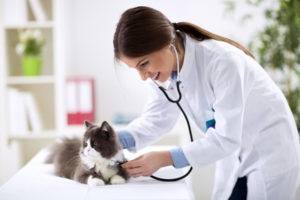
Although November, National Bladder Health Month, has technically ended, knowing about urinary obstruction could save your cat’s life.
Although November, National Bladder Health Month, has technically ended, knowing about urinary obstruction could save your cat’s life. Urinary obstructions are fatal if left untreated. If not treated early enough, they can also cause lasting damage to your pet’s urinary tract quickly. Urinary obstructions can progress rapidly because your cat is unable to relieve itself. Seek medical attention as soon as you can.
What is a Urinary Obstruction?
Urinary obstruction is a blockage in the lower half of the urinary tract. Urinary obstructions are most common in male cats, making it something you should look out for, especially in young and middle-aged cats.
What Can Cause a Urinary Obstruction?
Unfortunately, urinary obstructions are caused by a number of things. Typically, they are caused by urinary stones, strictures, or tumors. These are called physical obstructions. Mechanical obstructions are secondary to urethral spasm or swelling secondary to inflammation in the lower urinary tract. Feline Idiopathic Cystitis, or Idiopathic Feline Lower Urinary Tract Disease, is a common disease that can cause urinary obstructions.
Signs and Symptoms of a Possible Urinary Obstruction in Cats
Most symptoms of a possible urinary obstruction in cats do not show up until the condition is advanced. However, here are some signs:
- Increased vocalizations, especially when trying to urinate
- Increased attempts at urination (your cat will try to urinate frequently with little or no urine output)
- Licking their hindquarters more
- Vomiting
These symptoms may look like constipation or a simple urinary tract infection, but a urinary obstruction can become deadly in 24 hours if left untreated. Contact us immediately if you suspect a urinary obstruction.
Treatment for Your Cat’s Urinary Obstruction
When you bring your cat in, we will examine them. We will check for a large, uncomfortable, and hard bladder. If the urinary obstruction is caught early enough, the bladder may be smaller. We may need a radiograph to fully assess your cat’s bladder. Our veterinarian will administer medications to alleviate any discomfort and pain your cat may be in. Urinary obstructions require sedation for our veterinarian to be able to pass a urinary catheter to relieve your cat. Your cat will stay with us for further treatment including IV fluids, medications, and monitoring the urine output. Diagnostic testing will be done to find the underlying cause and evaluate any other problems such as kidney damage that could have been caused from the obstruction.
Here at Mount Carmel Animal Hospital, We’ll Treat Your Pets Like Family!
Mount Carmel Animal Hospital has been serving the Northern Baltimore/Southern York community for over 30 years and is proud to be an independently operated, small animal practice committed to excellence in veterinary medicine and client service. From grooming to wellness services, along with Canine Life Skills Training Courses, and surgical procedures, we have the expertise that will best serve the needs of you and your pet. Contact us at 410-343-0200 and follow us on Facebook!
